Thomas Malthus
AN ESSAY ON THE PRINCIPLE OF POPULATION AND OTHER WRITINGS
Introduction and Notes by
ROBERT J. MAYHEW
Contents
PENGUIN  CLASSICS
CLASSICS
AN ESSAY ON THE PRINCIPLE OF POPULATION AND OTHER WRITINGS
THOMAS ROBERT MALTHUS was the second son born into a relatively affluent Surrey family in 1766. He was privately schooled and then went to Jesus College, Cambridge, completing his degree in 1788. He went on to take an MA in 1791 and to become a fellow of the college in 1793. Malthus was also ordained as a minister of the Church of England in 1788. In 1798 Malthus anonymously published his Essay on the Principle of Population, unquestionably the most influential demographic treatise ever written and a pioneering work of social science. He went on to produce much expanded editions of the Essay throughout his life, the first appearing in 1803 and the last in 1826. Malthus married in 1804 and in the subsequent year he was appointed Professor of History and Political Economy at the East India College in Haileybury, the first professorial appointment in economics in Britain and one he would hold for the rest of his life. Malthus contributed pamphlets about the key political debates of the early nineteenth century such as the Poor Laws, the Corn Laws and the condition of Ireland and crystallized his ideas as an economist in Principles of Political Economy (1820). Malthus was a Fellow of the Royal Society, an Associate of the Royal Society of Literature and a founder member of both the Political Economy Club and the Statistical Society. He died in 1834.
ROBERT J. MAYHEW is Professor of Historical Geography and Intellectual History at the University of Bristol. He was educated at Hertford College, Oxford, and St Johns College, Oxford, and held a Fellowship at Corpus Christi College, Cambridge. He is the author of Malthus: The Life and Legacies of an Untimely Prophet (2014).
Introduction
In January 2014, in their annual state of the globe address entitled 3 Myths that Block Progress for the Poor, Bill and Melinda Gates suggested that one great myth preventing global development is the idea that population growth makes advances in personal and societal wealth and happiness impossible. The Gateses focused on life in the present and visions for the future, but in addressing myths about population they honed in on the contributions of a man born 250 years earlier, Thomas Robert Malthus. They commented that going back at least to Thomas Malthus, who published his An Essay on the Principle of Population in 1798, people have worried about doomsday scenarios in which food supply cant keep up with population growth and ascribed to him a laissez-faire approach to development letting children die now so they dont starve later, before commenting that this doesnt actually work, thank goodness. It is not clear from these comments if the Gateses have actually read the works of Malthus (as this volume will allow you to!), but a good part of Malthuss historical power and importance rests precisely in the fact that people dont have to read him to invoke his name.
The Gateses are by no means alone in framing Malthuss work as something still to be jousted with in the present day. On the contrary, recent years have witnessed commentators see in Malthus a prophet, variously false or visionary, someone who can help us understand such global issues as the food price spike of 20078, global economic depression in the credit crunch and impending environmental Armageddon.and economic discussions in a way not seen since the fears of a population bomb that gripped policy makers in the 1960s and 70s.
Public commentators such as John Gray have suggested Malthus explains the future of global warfare in the twenty-first century far more effectively than discussions of the clash of political or religious ideals, while Niall Ferguson has told us in the context of both rising food prices and increased price volatility not to count Malthus out too soon. Given this hubbub of discussion around Malthus, this introduction will give insight into his early life and the ideas set out in An Essay on the Principle of Population of 1798, which forms the core of this edition, before moving on to address how his ideas evolved over the remaining thirty years of his life as excerpted in this volume. I will conclude by addressing the legacy of his ideas, the question of why Malthuss work has remained so perennially modern as to engage the attention of telecom tycoons and Nobel prizewinners alike.
MALTHUSS LIFE AND INFLUENCES UNTIL 1798
Thomas Robert Malthus, known universally as Robert or Bob, was born in 1766 into a family at the upper end of the middling sort in Surrey. As the second son, however, Malthus would have to work to earn his living, despite the comparative affluence of his origins. In many ways the manner in which Malthus was educated can help us to understand his achievement both in the Essay of 1798 and in his lifes work more generally. Malthuss initial education was under the tutelage of the poet, cleric and writer Richard Graves in the village of Claverton, just outside the fashionable spa town of Bath. The curriculum there was the standard fare for its era, centred on the acquisition of ancient languages and literature, and yet Graves himself was anything but a run-of-the-mill teacher. On the contrary, he has some claim to being one of the finest satirists of his age, thanks to his authorship of The Spiritual Quixote (1773), a satire on the irrationalism and pomposity of the Methodism of John Wesley and George Whitefield written in implicit support of the Anglican Church of which Graves was an ordained minister. While one cannot draw direct lines of force between Gravess satire and Malthuss later writing, it is notable that the 1798 edition of the Essay is laced with satirical attacks on the enthusiastic advocates of French revolutionary ideals who saw the events of 1789 as ushering in a new age of perpetual improvement. Malthus took Gravess religious satire and transferred it to the realm of politics:
A writer may tell me that he thinks man will ultimately become an ostrich. I cannot properly contradict him. But before he can expect to bring any reasonable person over to his opinion, he ought to show, that the necks of mankind have been gradually elongating; that the lips have grown harder, and more prominent; that the legs and feet are daily altering their shape; and that the hair is beginning to change into stubs of feathers. And till the probability of so ).
Under Graves, Malthuss education was conventional, and yet Malthuss father Daniel was anything but a provincial member of the establishment, instead being a passionate advocate of the emancipatory ideas of Jean-Jacques Rousseau. And it is this paternal radicalism that probably explains why Malthus was moved from Gravess school to the leading Dissenting school of the age in Warrington in the early 1780s. In an age when preferment in the professions often required subscription to the articles of faith of the Anglican Church, sending Malthus to a Dissenting academy was a brave or, less charitably, foolhardy move. Still Daniel clearly wanted his son to have a less restrictedly classical education. Warrington saw Malthus educated by one of the great rationalist critics of church tradition of the age, Gilbert Wakefield, and also saw him encounter at first hand the traces of the emergent economy of coal and factories, about whose impact on the balance of the British economy Malthus would be enduringly ambivalent, an ambivalence that would first be displayed in the sections of the 1798

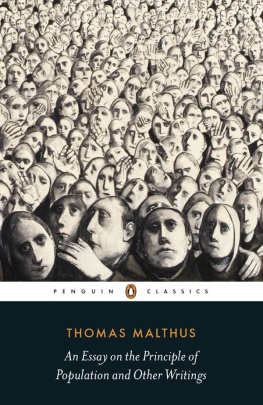

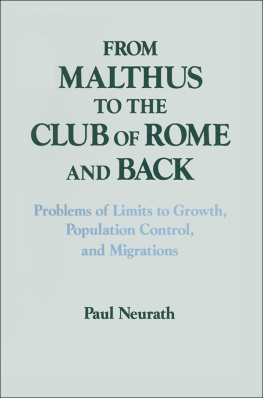
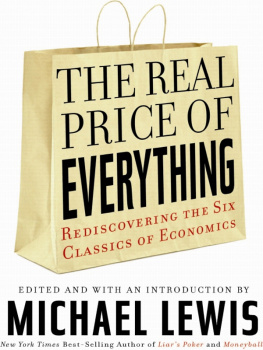
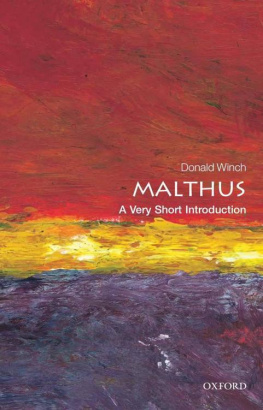
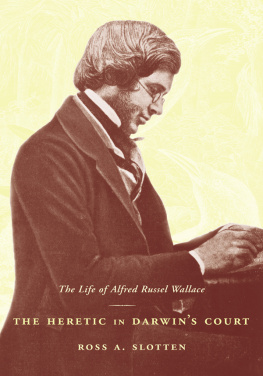



 CLASSICS
CLASSICS